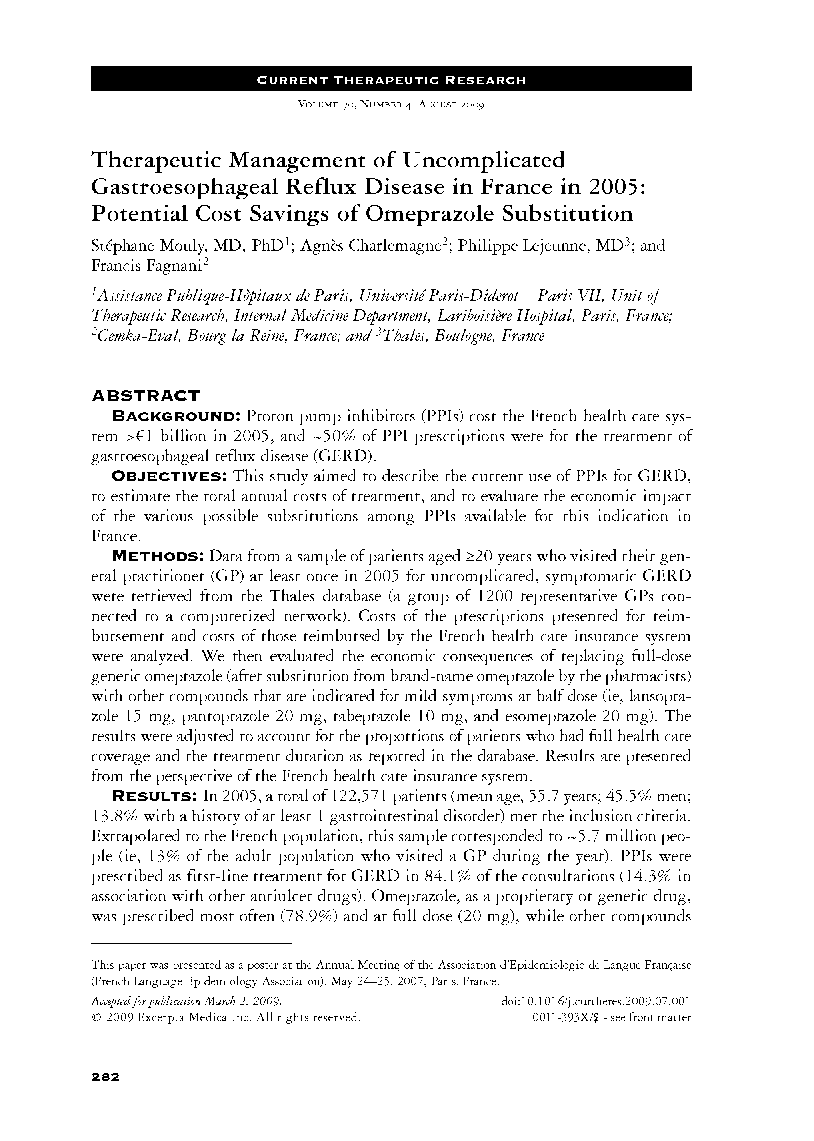| کد مقاله | کد نشریه | سال انتشار | مقاله انگلیسی | نسخه تمام متن |
|---|---|---|---|---|
| 4196929 | 1278726 | 2009 | 17 صفحه PDF | دانلود رایگان |

Background: Proton pump inhibitors (PPIs) cost the French health care system >€1 billion in 2005, and ~50% of PPI prescriptions were for the treatment of gastroesophageal reflux disease (GERD).Objectives: This study aimed to describe the current use of PPIs for GERD, to estimate the total annual costs of treatment, and to evaluate the economic impact of the various possible substitutions among PPIs available for this indication in France.Methods: Data from a sample of patients aged ≥20 years who visited their general practitioner (GP) at least once in 2005 for uncomplicated, symptomatic GERD were retrieved from the Thales database (a group of 1200 representative GPs connected to a computerized network). Costs of the prescriptions presented for reimbursement and costs of those reimbursed by the French health care insurance system were analyzed. We then evaluated the economic consequences of replacing full-dose generic omeprazole (after substitution from brand-name omeprazole by the pharmacists) with other compounds that are indicated for mild symptoms at half dose (ie, lansoprazole 15 mg, pantoprazole 20 mg, rabeprazole 10 mg, and esomeprazole 20 mg). The results were adjusted to account for the proportions of patients who had full health care coverage and the treatment duration as reported in the database. Results are presented from the perspective of the French health care insurance system.Results: In 2005, a total of 122,571 patients (mean age, 55.7 years; 45.5% men; 13.8% with a history of at least 1 gastrointestinal disorder) met the inclusion criteria. Extrapolated to the French population, this sample corresponded to ≈5.7 million people (ie, 13% of the adult population who visited a GP during the year). PPIs were prescribed as first-line treatment for GERD in 84.1% of the consultations (14.3% in association with other antiulcer drugs). Omeprazole, as a proprietary or generic drug, was prescribed most often (78.9%) and at full dose (20 mg), while other compounds (lansoprazole, pantoprazole, rabeprazole, and esomeprazole) were prescribed at half dose in 64.3% of cases. The extrapolated annual cost of PPIs reimbursed for this indication was €465.02 million at a mean reimbursement level of 72.7%. Brand-name omeprazole still accounted for ≈11% of the total cost reimbursed. Complete replacement of brand-name omeprazole with its generic counterpart would have reduced costs by €18.35 million (a decrease of 4.3% in the total reimbursed expenditure). The switch from generic full-dose omeprazole to a half dose of other PPIs would have allowed further savings ranging from €2.59 million (with lansoprazole) to €13.19 million (with pantoprazole).Conclusion: In accordance with recent recommendations for the treatment of uncomplicated GERD and based on the 2006 PPI pricing, switching from branded full-dose omeprazole to generic omeprazole or to the use of half doses of other PPIs may allow cost savings in France.
Journal: Current Therapeutic Research - Volume 70, Issue 4, August 2009, Pages 282-298